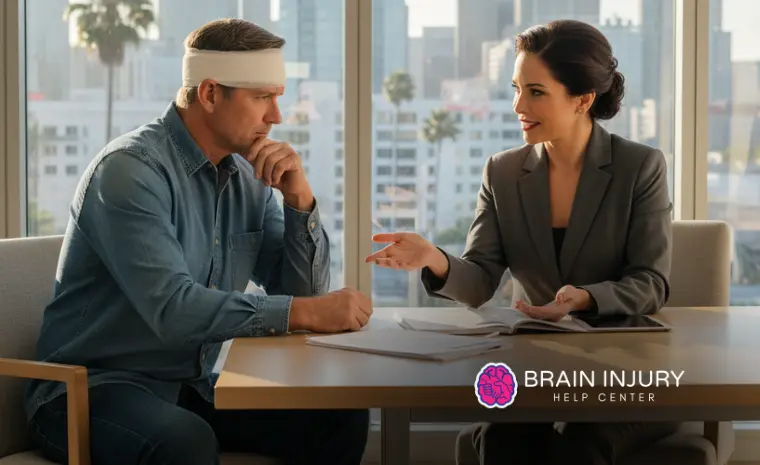Summary
A truck accident claim involving a traumatic brain injury (TBI) requires strong medical proof, including MRI scans and expert testimony. Brain injuries often go undiagnosed but can cause lifelong disabilities. This guide explains how TBIs impact your health and your settlement value and why expert legal help is key to winning maximum compensation.
Table of Contents
You’re driving down the freeway, heading home after a long shift. Suddenly, a semi-truck swerves into your lane without warning. The impact is massive. You wake up in a hospital bed, hours or days later, disoriented, in pain, and unable to remember what happened.
This is the terrifying reality for many survivors of truck crashes. And while visible injuries may heal, damage to brain tissue is often misdiagnosed or dismissed, especially if there are no skull fractures or obvious bleeding.
If you’re pursuing a truck accident claim, proving a TBI is the key to securing full compensation. In this guide, we’ll explain why evidence matters, how these injuries affect your case settlement, and why working with the right legal and medical team is essential.
The Medical Proof You Need in a Truck Accident TBI Case

Brain trauma research isn’t just about showing symptoms—it’s about documenting all medical evidence that connects the injury to your crash. In a truck accident claim, the credibility of your medical proof can make or break your case.
Key forms of evidence include:
- MRI and CT scans: reveal bleeding, swelling, or damage to brain tissue.
- Neuropsychological testing: measures memory, concentration, and cognitive impairment.
- Diffusion tensor imaging (DTI): detects microscopic white matter damage invisible in standard scans.
- Expert medical testimony: from neurologists and neuropsychologists who can explain how the impact caused an intracranial injury.
A traumatic brain injury often lacks visible signs; this combination of technology, data, and expert interpretation is crucial to proving the true extent of your harm and the lifelong impact it may have.
Establishing Liability: Who’s At Fault in a Truck Accident Claim
The next critical step is proving negligence—the legal foundation of every successful truck accident claim. Proving fault means showing someone’s actions (or inaction) directly caused the crash.
According to the Federal Motor Carrier Safety Administration (FMCSA) and the National Highway Traffic Safety Administration (NHTSA), 87% of large truck crashes are caused by driver-related factors such as:
- Driver fatigue or drug use often violates federal rest-hour or substance policies
- Employer negligence includes poor hiring practices, inadequate training, speeding, or ignoring FMCSA regulations.
- Defective truck components, like worn brakes or tire blowouts, that trigger catastrophic collisions
Establishing liability requires examining police reports, black box data, driver logs, and vehicle maintenance records. Building a compelling brain injury lawsuit after a truck crash requires connecting every act of negligence with your TBI through documented medical and technical evidence.
How TBIs Impact the Value of Your Settlement
Brain damage affects every part of your life—your health, career, relationships, and future. That’s why your personal injury attorney must fight for a settlement that accounts for the full, lifelong impact of your traumatic brain injury and the rehabilitation it requires. TBIs often result in:
- Skyrocketing medical bills and extended hospital stay
- Lost wages or permanent loss of earning ability
- Ongoing therapy, rehabilitation, or in-home assistance
- Post-concussion syndrome, memory problems, and reduced brain function
- Long-term impairments reflected in tools like the Disability Rating Scale
Symptoms That Show Long-Term Cognitive Damage
Some traumatic brain injury symptoms don’t appear immediately—but that doesn’t make them any less damaging.
Watch for signs such as:
- Memory loss that affects daily function
- Personality change or sudden mood swings
- Dizziness, headaches, or nausea triggered by movement or noise
- Cognitive impairment—difficulty concentrating, reasoning, or processing information
These symptoms often stem from closed head injuries, brain contusions, or interrupted blood flow.
How a California Brain Injury Lawyer Builds a Winning Case
This isn’t a fight you should take on alone. Traumatic brain injury cases from truck collisions are some of the most complex in personal injury law. Our skilled personal injury law firm in California:
- Coordinate expert witnesses, including neurologists, accident reconstructionists, and vocational analysts
- Manages complex documentation like MRI scans, pay records, and the Disability Rating Scale to calculate full damages
- Handles insurer negotiations and, when needed, builds a strong trial strategy backed by medical and legal experts
The right lawyer doesn’t just file paperwork—We fight for your future.
FAQs About Brain Injuries After a Truck Accident
Can a skull fracture lead to permanent brain damage?
Yes. A skull fracture may cause bleeding, swelling, or pressure on the brain tissue, increasing the risk of permanent cognitive and motor function loss.
What is a diffuse axonal injury (DAI)?
A DAI is a severe form of traumatic brain injury where the brain’s nerve fibers are torn due to rapid movement, often seen in motor vehicle accidents like truck crashes.
How does the Glasgow Coma Scale affect my injury claim?
The Glasgow Coma Scale helps measure the severity of a brain injury. Lower scores indicate more serious impairments, which can increase the settlement value in a brain injury lawsuit.
What if my symptoms develop weeks after the accident?
Delayed symptoms like post-concussion syndrome or personality change are common in closed-head injuries. You may still have legal grounds to claim damages if your medical records support the link.
Is brain injury rehabilitation covered in a truck accident claim?
Yes. Your brain injury claim can include costs for rehabilitation, hyperbaric oxygen therapy, and other surgical procedures if prescribed by your medical team.
Your Future Is Worth Fighting For
A traumatic brain injury after a truck crash isn’t just a medical emergency—it’s a life-changing event with lasting physical, emotional, and financial consequences. Successfully proving a truck accident claim takes more than a diagnosis; it takes medical documentation, expert support, and powerful legal advocacy.
Contact the Brain Injury Help Center today for a free case evaluation. We fight for the medical treatment you need and the money you deserve.









